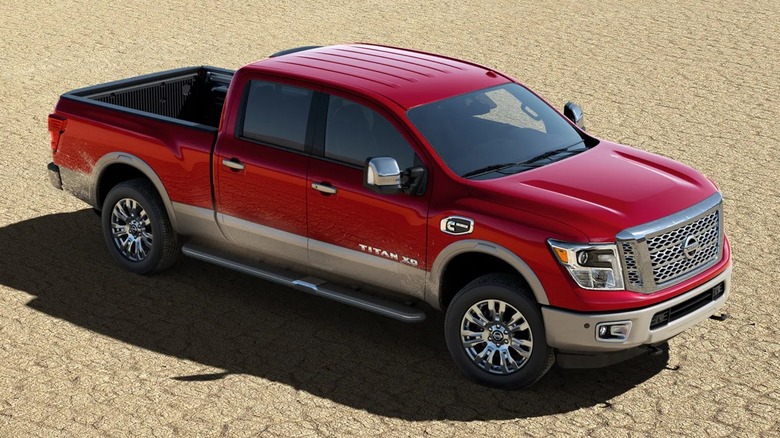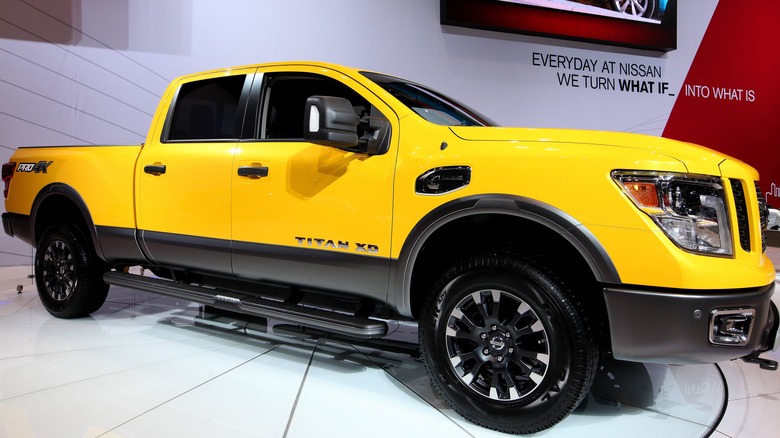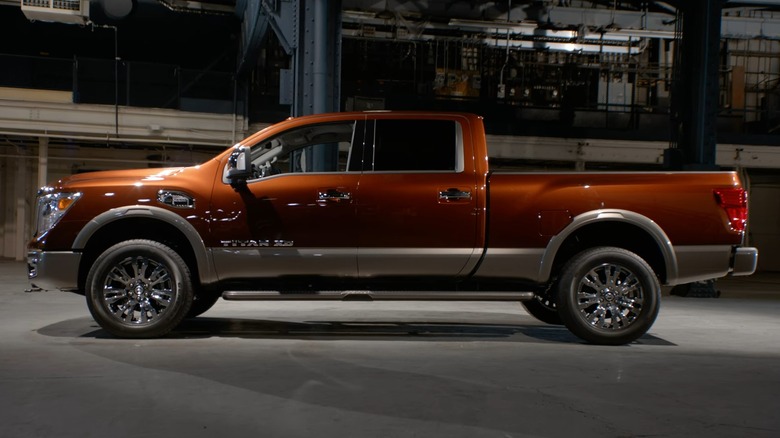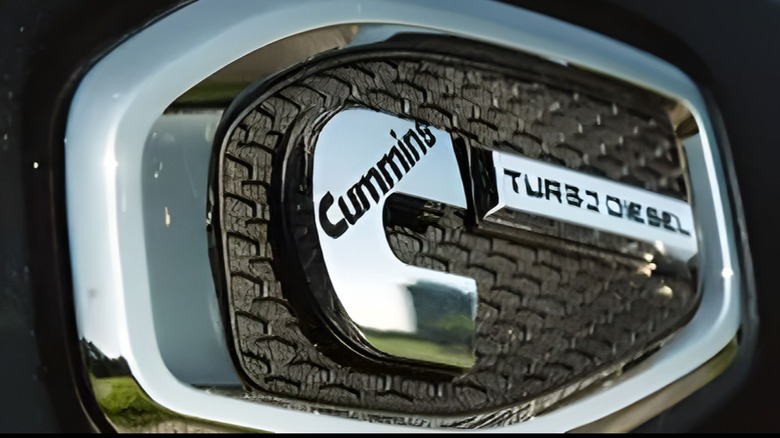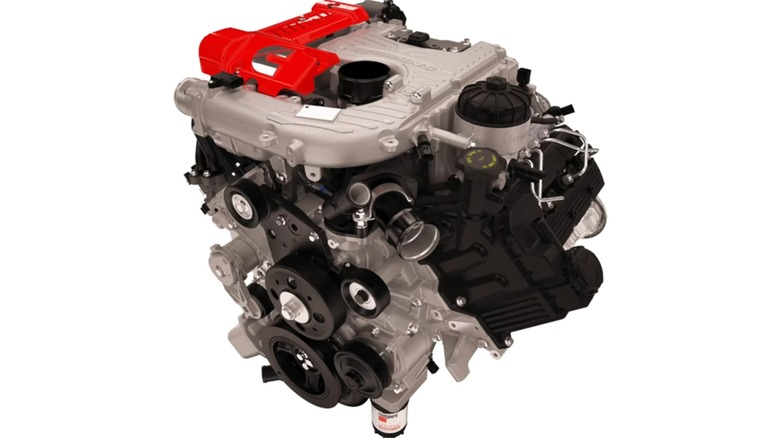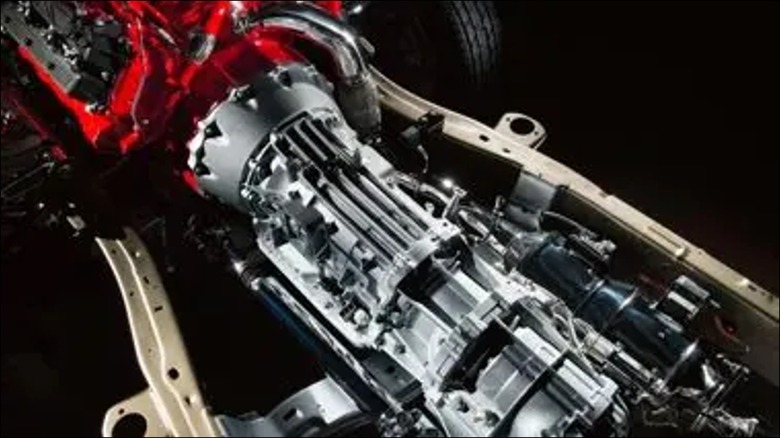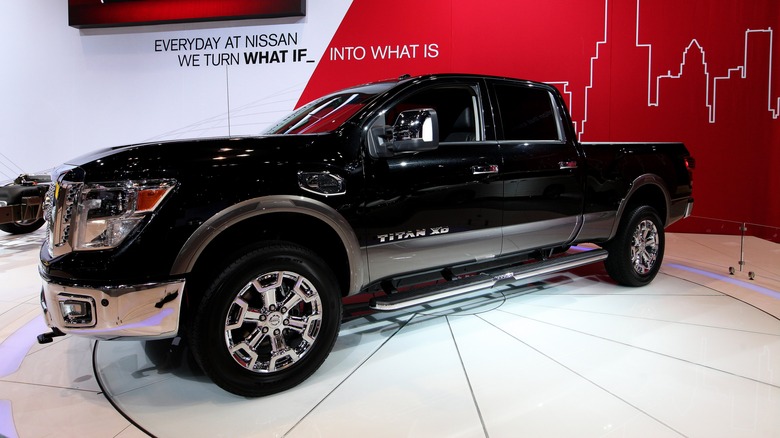5 Commonly Reported Problems With The 5.0L Cummins V8 Engine In The Nissan Titan
Few engine and vehicle debuts have been anticipated with the same level of excitement as the 5.0L Cummins-powered Nissan Titan XD. For years, Cummins has produced some of the best diesel motors ever to grace the engine bays of non-commercial cars. The company has developed a cult-like following of dedicated admirers who adamantly proclaim that Cummins produces the best diesel engines and that they're far superior to other diesel manufacturers, like Power Stroke and Duramax. So, when fans heard Cummins would be building a new motor for the Nissan Titan, they were ecstatic and intensely intrigued, to say the least.
However, since the 5.0L Cummins was released in the 2016 Titan XD, a series of devastating problems have plagued the engine and the drivers who own them. From multiple emissions control system malfunctions to turbocharger failure and fuel system flaws, the Titan XD and its Cummins engine have been a letdown for fans and a money sink for drivers.
These issues were so prevalent that Nissan decided to discontinue the Cummins-powered Titan XD in 2019, and in late 2023, the National Highway Traffic Safety Administration launched an investigation into the Cummins-powered pickups. To help you better understand these motors and the difficulties they frequently produce, we compiled this list based on customer complaints, government recalls, and professional mechanics' testimonies. Here's what you need to know about the 5.0L Cummins engine and its five most commonly reported issues.
DEF system malfunctions
Diesel exhaust fluid (DEF) is a combination of urea and deionized water used in modern diesel emissions control systems. Like all machines powered by fossil fuels, diesel engines release harmful emissions into the air we breathe. One of the most toxic of those emissions is nitrous oxide (NOx). Introducing DEF to a diesel vehicle's exhaust system — the catalytic converter, specifically — helps start a chemical reaction that turns NOx emissions into harmless water and nitrogen molecules.
The 2016 to 2019 Titans with 5.0L Cummins diesel engines are notorious for issues with their DEF systems. The DEF pump, specifically, is a known failure point due to its vulnerability to particles and contaminants left behind by the fluid itself. When the pump fails, the Cummins engine may enter limp mode — a system safety measure that will kill all non-essential functions, like AC, and radically reduce the vehicle's speed. Other symptoms of pump failure include DEF leaks and a dashboard warning light.
DEF systems have been a legal requirement for diesel vehicles since 2010, meaning Titan owners who experience this issue can't simply remove the DEF system or ignore a failed DEF pump. Unfortunately, the fix is expensive. The pump itself costs nearly $1,700 from a Nissan dealership. Factor in the mechanic's labor time, and you could be looking at a total repair bill of well over $2,000.
Turbocharger failure
Turbochargers may be known primarily as aftermarket add-ons for sports cars or stock options for performance vehicles. While they're becoming more common as standard features on everyday passenger cars, many people don't realize that most diesel engines have been built with turbos for years. Automakers build diesel engines with turbos to take advantage of one of the most popular forced induction methods, which is a type of air intake system that significantly increases an engine's power and efficiency.
Turbocharger failure is a common problem for the Titan XDs, especially those from the 2016 model year. The issue stems from a manufacturer's flaw that causes the turbos to spin without adequate lubrication. Ultimately, this issue causes metal shavings to blow into the engine, damaging internal components like pistons and valves and resulting in symptoms like the appearance of a check engine light and poor engine performance.
The issue with the Titans' turbocharger was so bad that the National Highway Traffic Safety Administration (NHTSA) issued a recall and technical service bulletin for more than 12,000 Titan XDs from the 2016 model year. The bulletin provides three potential outcomes for Titan owners experiencing turbo failure. If the diagnostic trouble code (DTC) for engine oil pressure is present, Nissan will replace the engine and the turbo. If no DTC is present, Nissan will remove the turbo and inspect it for damage and signs of failure. If the turbo shows signs of catastrophic damage, Nissan will replace both the engine and the turbo. However, if the turbo passes inspection, meaning it has not yet progressed to the point of damaging the engine, then Nissan will replace the turbo alone.
EGR valve and cooler failure
Exhaust gas recirculation (EGR) systems are emissions control components that allow a car to recycle some of the unburned gases that escape the engine. They contribute to increased efficiency, help reduce the amount of money we spend on fuel, and also protect our environment. Like the DEF system, EGR systems specifically target NOx emissions. By recycling unburned gases back through the engine, the EGR system reduces the amount of harmful NOx emissions entering the atmosphere.
The EGR valve on Nissan Titan XDs is notoriously vulnerable to carbon buildup. Over time, this can cause the valve to get stuck in either its open or closed position. When this occurs, the vehicle's performance will drop drastically, leading to issues like engine misfires, a rough idle, and a check engine light. Besides the valve, the EGR cooler is also a significant problem for Titan XD owners. Due to a manufacturer's defect, the cooler is known to crack, leading to internal coolant leaks and poor performance. The NHTSA issued a recall for the EGR cooler in Titan XDs from the model years 2016 to 2017. However, Nissan never formally addressed the EGR valve problems, forcing owners to pay out of pocket for the roughly $1,500 replacement.
Fuel system malfunctions
Automotive fuel systems — in both gas and diesel vehicles — are responsible for moving fuel from the gas tank to the engine. The systems are comprised of a storage tank, a fuel pump, a filter, a series of fuel lines, injectors, and more. The fuel pump is the heart of the system. While older vehicles had mechanical fuel pumps driven by the camshaft or crankshaft, most modern cars have electric fuel pumps that rely on a solenoid to create the suction force that propels fuel toward the injectors.
Like most modern cars, the Titan XD with the 5.0L Cummins engine has an electric fuel pump. Unfortunately, the Titan XD's fuel pump is another known failure point for the Cummins-powered pickup. Many owners even report experiencing fuel pump failure well below the 100,000-mile mark. According to most experts, the issue stems from a manufacturer's flaw — the pump is unable to filter out contaminants and particles found naturally in diesel fuel. These impurities enter the pump's internal parts, causing damage and, eventually, complete failure. When this occurs, you're likely to experience symptoms like engine misfires, a rough idle, and various other performance issues.
Nissan will replace faulty fuel system components for affected drivers — for a cost. However, dealer fixes rarely solve the problem, and many drivers complain of replacing their fuel pumps multiple times within a very small stretch of mileage. The better fix, according to experts and Titan owners alike, is to install a fuel air separation system (FASS). These systems do a much better job of filtering contaminants out of diesel fuel. The downside is these systems are expensive — roughly $700 to $800. Nissan doesn't cover these systems or pay for their installation, so drivers who want to fix their fuel system issues must fend for themselves.
Transmission flaws
The transmission isn't technically part of a car's engine. It connects to the engine and harnesses the motor's power, allowing you to travel at different speeds depending on your needs and driving conditions. The transmission is part of both the powertrain and drivetrain. However, the transmission is still its own separate component and should be classified as such.
That said, we've included transmission failure on this list because it's such a prevalent problem for the 5.0L Cummins-powered Titan XDs. The 2016 to 2019 Nissan Titan XDs were built with a six-speed Aisin automatic transmission. Owners across the board report serious issues with these transmissions, including hard shifts, overheating, and complete failure. Most experts generally agree that the issue is due to improper factory calibration between the 5.0L Cummins and the transmission, as well as manufacturing defects that leave the transmission prone to premature failure.
Nissan has attempted to resolve the problem by performing transmission "flashes" or computer resets for affected customers. However, Titan owners report that this fix only works temporarily and that after a short period, their transmissions began displaying issues once again. Outside resetting the transmission's computer or control module, the only remaining fix is to replace the transmission with a more robust version. Unfortunately, a transmission replacement is extremely pricey, and Nissan won't cover the cost for its customers. Drivers who choose to replace their transmissions can expect to pay thousands of dollars for this repair.
Is the Nissan Titan XD with Cummins engine worth it?
So, given all the problems that frequently plague the Titan XD, should you buy one? First, if you want a Titan with the 5.0L Cummins engine, you'll have to hunt for a used one, as Nissan discontinued the Cummins-powered pickup in 2019. Second of all, the difficulties described above aren't the only issues that the Titan XDs face — they're just the most common issues Titan XD owners have reported experiencing. Outside the five issues we covered above, the Cummins-powered pickup is prone to various issues, including electrical malfunctions, bad stock tires, and issues with accessory features.
Finally, it's worth noting that the diesel version of the Titan provides only marginally more power than the gas-powered trucks. The Cummins engine produces about 160 more pound-feet of torque than the gas engine. However, the diesel motor falls short when it comes to horsepower — the gas engine is capable of 390 horsepower, while the Cummins motor has a max output of around 310 horsepower. In terms of towing capacity, both engines can handle similarly heavy loads. Based on these performance specs and the innumerable problems the Cummins-powered Titan is known to produce, you're probably better off avoiding the diesel pickup and looking for a solid gas-powered Titan.
